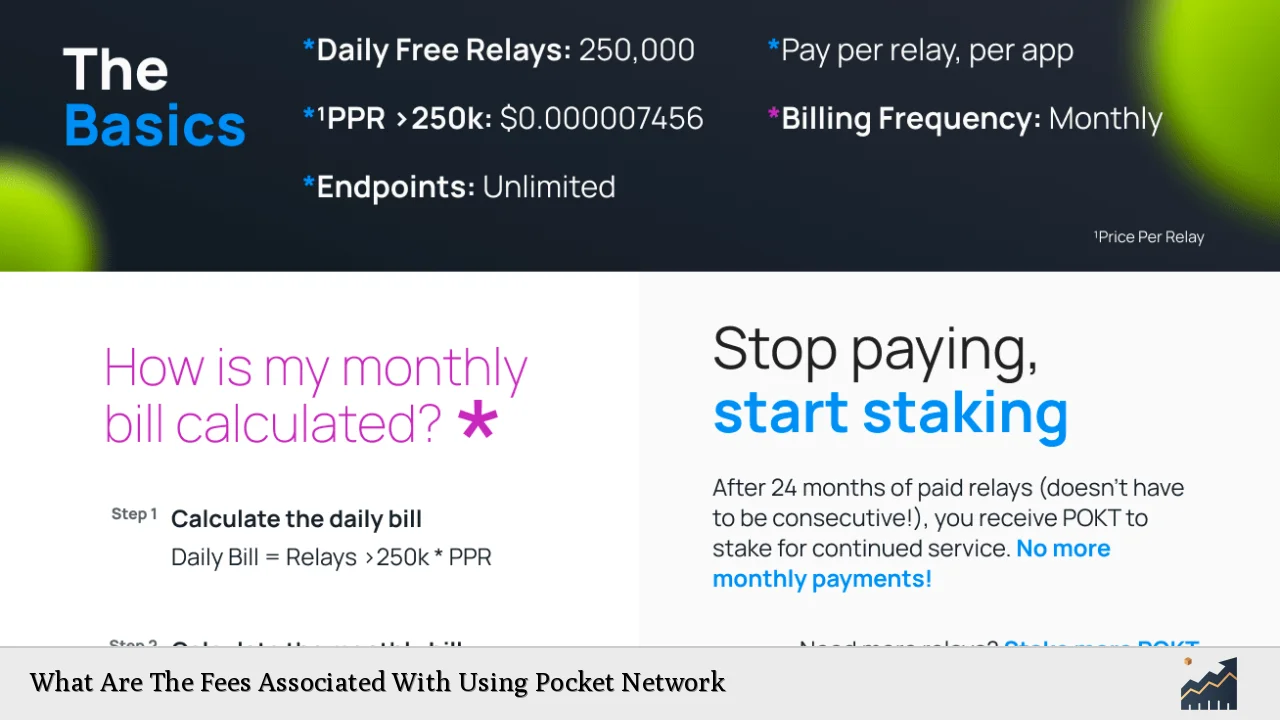Pocket Network is a decentralized protocol designed to facilitate data relay services between various blockchain networks and decentralized applications (dApps). As with any financial service, understanding the associated fees is crucial for users, especially investors and developers looking to integrate blockchain technology into their applications. This article provides a comprehensive analysis of the fees linked to using Pocket Network, including transaction costs, network fees, and other potential expenses.
| Key Concept | Description/Impact |
|---|---|
| Service Fee | Pocket Network charges a standard service fee of 1.5% on transactions. This fee encompasses all operational costs, ensuring transparency without hidden charges. |
| Network Fee | An additional network fee is incurred for each payout, which varies based on the Bitcoin network’s conditions. This fee typically ranges from 500 to 1000 satoshis per payout (approximately $0.10 to $0.25). |
| Relay Fees | For each relay processed by node operators, a fee of $0.00000085 in POKT is charged. This fee contributes to the operational costs of maintaining the network. |
| Staking Requirements | Node operators must stake between 15,000 and 60,000 POKT tokens to participate in the network, which represents a significant upfront cost for those wishing to operate nodes. |
| Transaction Variability | The total fees can fluctuate based on market conditions and network congestion, impacting the overall cost for users. |
Market Analysis and Trends
The demand for decentralized data relay services has surged as more developers seek reliable infrastructure for their Web3 applications. Pocket Network has emerged as a key player in this space, processing billions of relays across multiple blockchains.
- Current Market Position: As of December 2024, Pocket Network’s token (POKT) price hovers around $0.06 with a market cap exceeding $100 million. The network has shown resilience despite volatile market conditions, with recent reports indicating a significant increase in protocol revenue—up 14 times over a 90-day period due to growing demand for decentralized services.
- User Growth: The number of nodes has expanded rapidly, with over 24,000 full nodes currently operational. This growth reflects the increasing interest in decentralized solutions as alternatives to traditional cloud services.
- Competitive Landscape: Pocket Network competes with centralized RPC providers by offering lower costs and enhanced reliability through decentralization. The upcoming Shannon upgrade aims to further enhance scalability and accessibility.
Implementation Strategies
For developers and investors considering using Pocket Network, understanding how to effectively implement its services is vital.
- Integrating with dApps: Developers can integrate Pocket’s API into their applications for seamless blockchain interactions. This requires understanding the fee structure and planning for transaction costs accordingly.
- Node Operation: Individuals interested in operating nodes should evaluate the staking requirements and potential returns based on relay volume. The economic model incentivizes node operators through rewards based on the number of relays processed.
- Cost Management: Users should monitor market conditions that affect network fees and plan transactions during periods of lower congestion to minimize costs.
Risk Considerations
Investing in or utilizing Pocket Network involves several risks that users should be aware of:
- Market Volatility: The cryptocurrency market is inherently volatile. The value of POKT can fluctuate significantly, impacting the cost-effectiveness of using the network.
- Regulatory Risks: As regulations around cryptocurrencies evolve, changes could affect how Pocket Network operates or how fees are structured.
- Operational Risks: While decentralization offers many benefits, it also introduces risks related to node performance and reliability. Users should consider these factors when relying on Pocket Network for critical applications.
Regulatory Aspects
Understanding regulatory considerations is crucial for users engaging with Pocket Network:
- Compliance Requirements: Depending on jurisdiction, users may need to comply with local regulations regarding cryptocurrency transactions and data handling.
- Tax Implications: Transactions involving cryptocurrencies may have tax consequences that vary by region. Users should consult tax professionals to understand their obligations.
- Future Regulations: As governments worldwide develop frameworks for regulating cryptocurrencies, ongoing compliance will be necessary for both users and node operators.
Future Outlook
Looking ahead, several trends are likely to shape the future of Pocket Network:
- Increased Adoption: As more developers recognize the benefits of decentralized infrastructure, demand for services like Pocket Network is expected to grow.
- Technological Advancements: Upcoming upgrades such as Shannon are anticipated to enhance network capabilities further, making it more appealing for developers.
- Market Expansion: With its cross-chain functionality and focus on scalability, Pocket Network is well-positioned to expand its reach within the growing DeFi ecosystem.
Frequently Asked Questions About What Are The Fees Associated With Using Pocket Network
- What is the primary service fee for using Pocket Network?
The primary service fee is 1.5% on transactions. - Are there any additional fees besides the service fee?
Yes, there is a variable network fee based on Bitcoin transaction conditions that typically ranges from 500 to 1000 satoshis per payout. - What are relay fees in Pocket Network?
The current relay fee charged by node operators is $0.00000085 per relay processed. - How much POKT do I need to stake to operate a node?
Node operators must stake between 15,000 and 60,000 POKT tokens. - Can fees change over time?
Yes, fees can fluctuate based on market conditions and network congestion. - What risks should I consider when using Pocket Network?
Users should consider market volatility, regulatory risks, and operational risks associated with decentralization. - How does Pocket Network compare with centralized RPC providers?
Pocket Network offers lower costs and increased reliability through its decentralized infrastructure compared to traditional centralized providers. - What is the future outlook for Pocket Network?
The future looks promising due to increased adoption of decentralized services and upcoming technological advancements aimed at enhancing scalability.
This comprehensive overview provides insights into the fees associated with using Pocket Network while addressing critical aspects such as market trends, implementation strategies, risk considerations, regulatory aspects, and future outlooks. Understanding these elements will help users make informed decisions when engaging with this innovative decentralized protocol.

